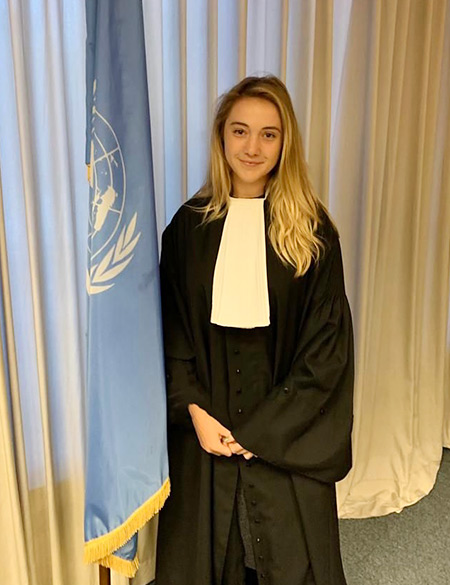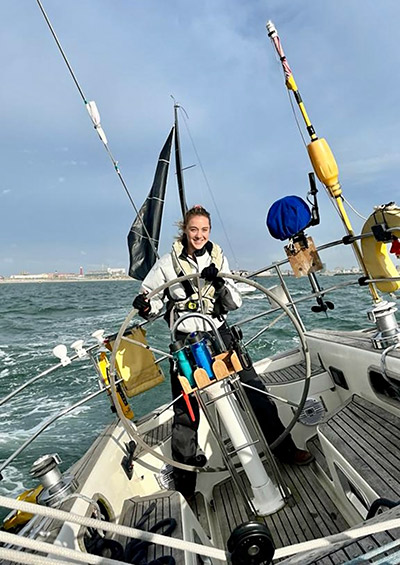Over the course of the summer, we are presenting some first-person accounts from Berkeley Law students immersed in fascinating work across the legal landscape. Much like the students themselves, the job opportunities and practical experiences they receive are diverse and extraordinary.

Paloma Palmer ’24 spent her 1L year as a member of the school’s International Human Rights Workshop, researching the use of sanctions in Afghanistan, and as an associate editor of the Berkeley Journal of International Law. In the upcoming school year, she will be a research assistant to Professor David Oppenheimer, director of the Berkeley Center on Comparative Equality and Anti-Discrimination Law. Before attending law school, Palmer worked in Dakar, Senegal as a Boren Scholar with the U.S. Department of Defense and participated in several human rights internships in France.
Below, she describes her work as a legal intern at the United Nations International Residual Mechanism for Criminal Tribunals in The Hague, Netherlands:
Our international criminal law institutions stand at a critical juncture as victims and communities seek justice for mass crimes committed in Ukraine — just as victims sought, and continue to seek, justice for the crimes against humanity committed in the former Yugoslavia almost three decades ago. The eerie parallels between events in Ukraine and in the former Yugoslavia is a reminder of the importance of strengthening the institutions that protect international human rights and pursue justice for communities.
I am privileged to have played my small part this summer as a legal intern at the United Nations International Residual Mechanism for Criminal Tribunals (“Mechanism”) in The Hague.
Within the Office of the Prosecutor (OTP), I support a team of international prosecutors in preparing an investigative case file concerning war crimes committed within the former Yugoslavia. To ensure as many persons as possible suspected of war crimes are brought to justice, the OTP continues to assist national authorities in the region by transferring whole cases for prosecution locally as well as evidence dossiers that may be of use in local investigations.
My core assignment was to draft an incident report for an investigative dossier, specifically focusing on the mass and isolated killings committed by military and police forces within a given village. To do this, I analyzed over 100 witness statements and cross-referenced them with jurisprudence from prior international criminal tribunals.
In addition, I conducted legal research on international criminal law issues and prepared memoranda for attorneys, such as on the International Criminal Court’s (ICC) jurisprudence concerning indirect co-perpetration. For this task I had the opportunity to compare national and international jurisprudence on modes of liability, isolate the relevant rule of law, criminal conduct, and holding for several ICC cases, and provide my own analysis of the findings.

I also had the opportunity to use my French language skills when translating the defense’s medical expert affidavit for the purposes of rebutting its claim that the indictee was unable to stand for trial in Prosecutor v. Félicien Kabuga, a case before the Mechanism concerning responsibility for the Rwandan genocide.
Given the gravity of the international crimes prosecuted at the Mechanism, I was initially shocked by the graphic nature of some of the testimony and exhibits, but eventually developed emotional strength in this regard. Overall, these assignments were phenomenal opportunities to learn more about the Yugoslav conflict, international criminal justice, and how to “think like a prosecutor.”
A highlight of my time in The Hague was working with multicultural teams and colleagues from different legal traditions. We always found ways to bring levity into the office during our breaks by discussing interesting differences between our cultures and playing competitive geography games.
While I spent my 9-5 with an international intern cohort, I tried to spend as much of my free time engaging in local culture and activities, whether it was joining the local yacht club, surfing by the pier, or road tripping through lesser-known corners of the Netherlands to golf. In fact, within two weeks of arriving in The Hague I joined a Dutch sailing team and competed in the North Sea Regatta — the largest sailing race in the region!
This internship experience has sparked my desire to pursue a career in litigation, and has equipped me with the skills to work effectively with international clients and partners.